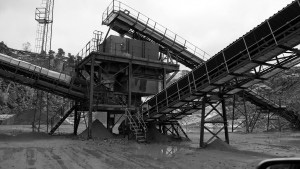Q. How would you describe you principal professional skill?
A. I came into the quarrying industry as a lab technician and I learned all about the materials that quarries produced and I moved into management probably about 30 years ago. So I suppose my main skill really is to look after the rock faces. The blasters come in and we discuss how they’re going to place the shots.
I would say I have to have quite a wide variety of skills; engineering, the materials themselves, the transportation of materials, so I would say quite a wide scope.
Q. When you say looking after the rock faces, what does that mean?
A. Blasting to keep the rock faces still in a safe condition. You can blast faces the wrong way believe it or not. It may look like the guys just put holes and just fire down shots but they don’t. It’s keeping the faces safe after you’ve fired them and planning ahead for road access. If you’ve got stones hanging off the top it’s dangerous for the diggers down below, so the faces have got to be blasted in the correct direction.
Q. And how long have you been here?
A. 17 years.
Q. And how long has Breeden Agrigates been here?
A. The history of the quarry… you’ve got me there! We’ve been quarrying commercially since about the early 1900’s.
There used to be about 40 people that worked in the quarry here and now I think were down to about 8. I mean it was very labour intensive before we had bigger machines. We used to have dumpers around here, we don’t have dumpers anymore, It all goes out on conveyor belts.
Q. And how did you learn your skill originally?
A. I was in the lab and I learnt all about the materials in the lab, that’s where I started off. I was there for 5 years; then into management. I worked my way around drilling and blasting, I’ve done dumper driving, and I’ve operated all the machinery.
Q. And do you think its helped doing all those different things?
A. Yes, very much so. There’s no way you can pull the wool over my eyes!
Q. And how do you think things of changed here since you first came?
A. I think modernisation and increasing the size of the machinery. The new machinery is far more efficient than what we had. Hydraulics for a start, I mean a hydraulic machine compared to an old-time machine … hydraulics is probably the biggest improvement.
Q. And young people, do you have apprenticeships here?
A. Not really because we’ve got a 17 years old minimum age to take people in. We’re pretty cut to the bone with people as it is. We do what they call the new apprenticeship schemes, which is what would be your NVQs. We’ve all done NVQs, it’s a government initiative to do that now. It’s good because all the guys get their certificates. We don’t bring a lot of young people into quarries; it’s a shame really.
Q. How do you develop what you do?
A. We’ve got a technical department and a research and development department as well that do all sorts of special products now, especially on the asphalt and concrete side. The asphalt now is using ground up rubber. Polymers go into some of these materials now to make them better lasting. The concretes have got things like fibers. They used to use a lot of steel mesh in the concrete now they use little things that are like plastic fibers, little strips they put in and that give it strength. The concrete side it getting very, very technical.
Q. How has the Internet and broadband changed what you do? Do you use it?
A. We used broadband Internet everyday.
Q. Is that for communication or ordering?
A. Yes, communication and ordering that’s all we use it for really. Oh, and sourcing parts as well.
Q. Your job here and the skills that you have, do they change the way you see the world?
A. I think so, yes. Not so much the skills but when you see the materials you wonder what they’re going to be used for. As you go round the world you see concrete the same as ours. You drive round quite a lot of America and you see quarries and you think, ‘Wow!’. I am interested in quarries all the time.
